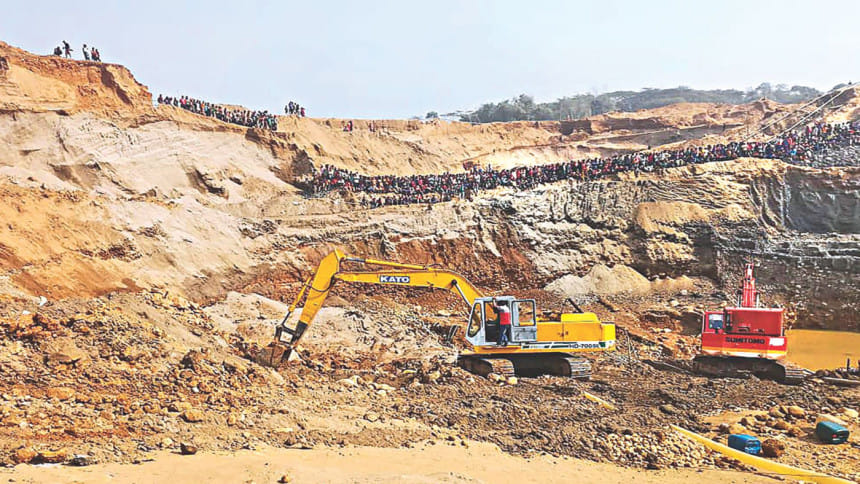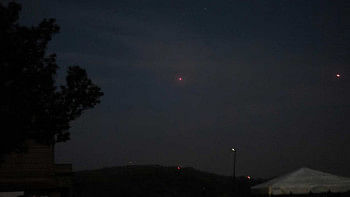Stone Extraction in Sylhet: Deaths continue, as does the illegal trade

High Court orders, death of workers -- many of them minors, environmentalists and rights activists going up in arms, drives by authorities -- nothing seems to deter the greed of stone traders, as parts of Sylhet are steadily transforming into a grotesque mound of dirt.
Stone extraction in four upazilas of Sylhet is rising alarmingly, despite regular administrative drives to stop the illegal activity. Over the last decade, this practice has claimed the lives of many stone workers and ravaged the environment, experts say.
In a recent report published by Bangladesh Environmental Lawyers Association (Bela), 76 stone workers died in the last three years (January 23, 2017 – January 20, 2020) while working at the sites. Two more, including a minor, died recently in the stone pits of despair as the earth above collapsed on them, raising the death toll to 78.
The Bela report stated that the authorities were hiding the actual death toll to avoid consequences.
On January 20, stone worker Liton Miah (22) died at Shah Arefin Tila area of Companiganj upazila. Police on January 23 arrested Aiyub Ali, an illegal stone trader who was operating at the pit where Liton was killed.
A probe body of the district administration published a report in February 2017, mentioning names of 47 stone traders responsible for illegal extraction and deaths of workers. Aiyub's name was on top of that list.
It took three years and another person dying to put Aiyub in jail. If that was not discouraging enough, almost all the listed people are currently roaming free and recommendations of the probe body remain unfollowed.
Currently, stones are being extracted at bordering areas of Companiganj, Gowainghat, Jaintiapur and Kanaighat upazilas.
Traders dig the earth around 200-250 feet deep, and cut river banks and hillocks, which is posing serious environmental threats to the region.
Eight rights activists from renowned organisations pressed a joint statement on January 22 this year. In the statement, they urged the administration to take adequate steps to put an end to all this.
A taskforce led by the upazila administration of Companiganj are carrying out regular drives at different illegal extraction areas. The taskforce, consisting of members of Department of Environment, Border Guard Bangladesh (BGB), police and other agencies, are destroying stone extraction machines, locally known as "boma machine", shallow machines and other equipment.
In recent drives, they also blocked the road to Shah Arefin Tila, filled several pits with water and seized equipment worth crores of taka.
Suman Acharjee, upazila nirbahi officer of Companiganj, said, "After taking charge three months ago, I started strict regular drives to stop illegal extraction. Over the time, the frequency of stone extraction is reducing, and we will continue our drives until it stops completely."
Locals and activists, however, are not too hopeful.
Abdul Karim Kim -- general secretary of Bangladesh Paribesh Andolon (Bapa), Sylhet chapter -- said, "There is no sign of illegal stone extraction ending, which is gradually destroying the environment at large. Amid some drives of the taskforce, stone traders are continuing their operation, even at night, when workers are more at risk of death."
"A huge initiative by the government is the only way to stop illegal stone extraction in Sylhet", he said.
Meanwhile, stone traders along with transport workers are regularly protesting at Companiganj's Bholaganj and Gowainghat's Jaflong, demanding authorities not interfere in their business.
Kazi Emdadul Islam, deputy commissioner of Sylhet, said, "Necessary steps to stop illegal stone extraction are being taken. Police should promptly arrest those who are responsible for the illegal activities and the workers' death."
"The protest of transport and stone workers is completely baseless. We have asked them not to go on strikes or any protest," he said.
When asked about the probe body's list, the DC said, "We always raise the issue at our coordination meetings and urge all responsible authorities to work together to put an end to this by following the probe report's recommendations."
It is worth noting that authorities on numerous occasions in the past have made promises, given excuses, and assured of stricter action.
In 2017, at least 32 people were killed while extracting stones. DoE had said they were dealing with a huge log of cases waiting to be heard at court. The then DC of Sylhet, Md Rahat Anwar, had said stricter action will be taken.
Last year, when the death toll had reached 50, DoE officials and the current DC said they were trying their best, and social/political initiative is necessary.
It is worth questioning why people are still getting crushed under the earth. Why is this illegal trade so persistent?
Abdul Karim Kim said, "Illegal stone extraction is a business worth hundreds of crores, and many who are responsible for stopping said activities are receiving money for not taking action. The beneficiary list includes local administration, law enforcement agencies, local council representatives to those even higher up the ladder."
"Lawyers and judges, who deliberately help the stone extractors in court also get some money in return," he said.
In reply, DC Emdadul said if authorities receive any specific accusations against influential individuals, they will take action. But officials can do nothing if vague allegations are put forth.
As far as the drives are concerned, Shah Shaheda Akhter, regional coordinator of Bela in Sylhet, said, "It's like The Tom and Jerry Show. Minutes after they conduct a drive, stone extractors resume their operation soon after. As far as we understand, the upazila administration doesn't have the ability to stop this anyway."
"The stand of police in these areas is questionable, and DoE doesn't seem too interested. If all agencies responsible remain silent, who will stop all this?" she said. "The situation will remain the same unless the government intervenes," she added.
And when it comes to specific accusations, seeking anonymity, some residents of Companiganj claim that the upazila chairperson Shamim Ahmed is the key person this industry. Shamim, however, denied being involved in any of this.
"I don't own any pit anywhere. Those who allege my involvement are basically my political opponents and their allegations is false," he said.
Recently, authorities seem to have ramped up their action against this illegal trade.
The HC on Monday gave a verdict which prohibited all forms of stone extraction at Shah Arefin Tila. Authorities conducted a drive at the site and ousted workers who were residing their unauthorised.
But the reality is still bleak. To regulate stone extraction, "The Mines and Minerals Rules 2012" was gazetted but to this day, all sections under the rules are being violated at all stone extraction sites.

 For all latest news, follow The Daily Star's Google News channel.
For all latest news, follow The Daily Star's Google News channel. 



Comments